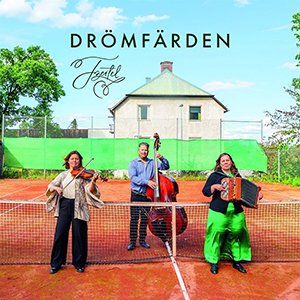Het Zweedse trio Tzeitel brengt met hun vierde album Drömfärden een aanstekelijke ode aan de klezmer.
English version below
De klezmer is van origine Joodse bruiloftsmuziek van de Ashkenazi Joden uit Oost-Europa. Muziek die gespeeld werd (wordt) tijdens bruiloften, die soms wel drie dagen duurden. De musici, de klezmorim, speelden dansmuziek, maar vaak ook rituele- en achtergrondmuziek en, als er gezongen werd, gebeurde dat in het Jiddisch. Een oud Germaanse taal die in het Hebreeuws wordt geschreven. Vanaf de klezmer-revival eind jaren ’70, gaat violiste Alicia Svigals en groepen als Kroke, De Amsterdam Klezmerband, Mames Babegenush en de Klezmatics (met Frank London) experimenteren met klezmer in combinatie met diverse andere muziekstijlen. De trompettist Frank London van de New Yorkse Hasidic New Wave voegt (samen met o.a. de virtuoze gitarist David Fiuczynski) zelfs een stevige dosis pop, rock en (avant-garde)jazz toe aan de klezmer en vormt daarmee een heel eigen en bijzonder metier binnen de Joodse muziek.
Het Zweedse trio Tzeitel bestaat nu zo’n 15 jaar en bracht drie CD’s op markt waar nu Drömfärden aan wordt toegevoegd. Het trio stelt zich als doel om met klezmer de luisteraar te raken tot in de ziel, tot in de kern, met traditioneel en nieuw repertoire. Zo heeft Omöjligdansen (van violiste Anna Cochrane) een prachtige melodie in een 7-tels maat die zo binnen het traditioneel repertoire zou passen, wat overigens ook geldt voor het openings- en titelstuk Drömfärden, dat door accordeoniste Sara Fridholm werd gecomponeerd. Het trio is zeer goed op elkaar ingespeeld, waarbij de drie partijen als een eenheid in elkaar grijpen en een geheel vormen. Fraai hoe viool en accordeon elkaar organisch afwisselen, om vervolgens in solistische en begeleidende passage samen smelten in een meerstemmig duo dat ferm en doortastend wordt ondersteund door de (wissel-)bas van Christopher Andersson Bång. Het trio heeft goed geluisterd naar Kroke. Een klezmertrio uit Krakau (Polen) met dezelfde bezetting, waarvan ze het traditionele Dem Trisker Rebens Khosid spelen.
Tzeitel beweegt zich met groot gemak door het klezmer-repertoire waarmee ze met verve zowel de dans- als concertstukken laten horen, met als kanttekening dat hun eigen composites ver uitsteken boven het traditioneel gemiddelde.
English version
The Swedish trio Tzeitel brings an infectious ode to klezmer with their fourth album Drömfärden.
Klezmer is originally Jewish wedding music from the Ashkenazi Jews from Eastern Europe. Music that was (is) played during weddings, which sometimes lasted up to three days. The musicians, the klezmorim, played dance music, but often also ritual and background music and, when singing, it was in Yiddish. An ancient Germanic language written in Hebrew. From the klezmer revival at the end of the 1970s, violinist Alicia Svigals and bands such as Kroke, the Amsterdam Klezmer Band, Mames Babegenush and the Klezmatics (with Frank London) started experimenting with klezmer in combination with various other music styles. The trumpet player Frank London of the New York Hasidic New Wave (together with the virtuoso guitarist David Fiuczynski, among others) even adds a strong dose of pop, rock and (avant-garde) jazz to the klezmer, thus forming its own special profession within Jewish music.
The Swedish trio Tzeitel has started about 15 years now and has released three CDs, to which Drömfärden has now been added. The trio aims to touch the listener with klezmer music to its soul, to its core, with traditional and new repertoire. For example, Omöjligdansen (by violinist Anna Cochrane) has a beautiful melody in a 7-beat bar that would easily fit within the traditional repertoire, which also applies to the opening and title piece Drömfärden, which was composed by accordionist Sara Fridholm. The trio is very well attuned to each other, with the three parts interlocking, tight as óne unit. Beautiful how violin and accordion alternate organically, and then merge in a solo and accompanying passage into a polyphonic duo that is firmly and decisively supported by the (alternating) bass of Christopher Andersson Bång. The trio listened carefully to Kroke. A klezmer trio from Krakow (Poland) with the same line-up of which they play the traditional Dem Trisker Rebens Khosid.
Tzeitel moves with great ease through the klezmer repertoire with which they perform both dance and concert pieces with verve, with the caveat that their own compositions far exceed the traditional average.
*Tzeitel: Drömfärden (Barrackas Records/Xango)
© Mattie Poels.


Geen reacties